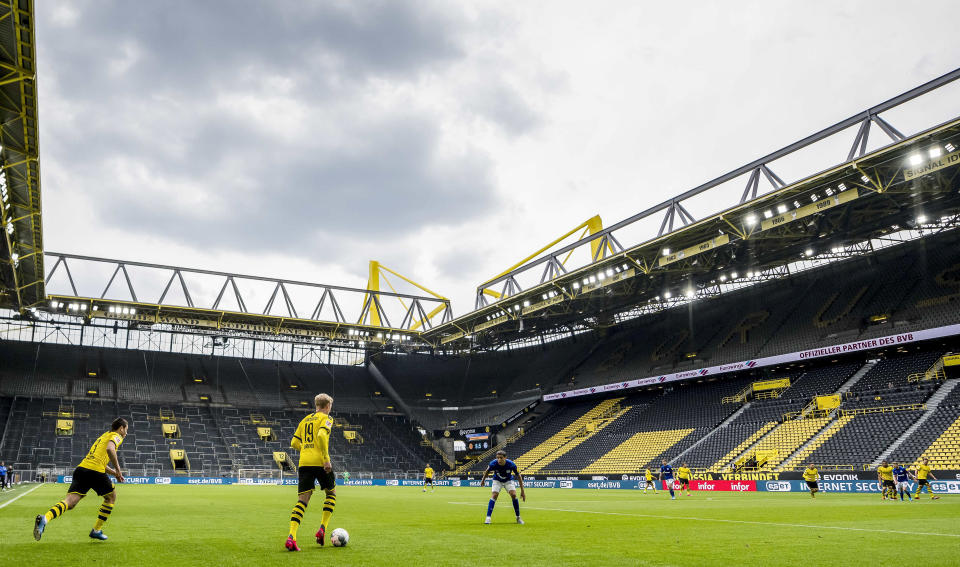Let the 'ghost games' begin: Bundesliga's coronavirus gamble off to jarring yet hopeful start
The Yellow Wall remained black, the color of the unfilled terraces. Borussia Dortmund’s fabled 25,000-man south stand didn’t have a single person on it, shorn of the usual thunderous thrum. All that was heard in Saturday’s Revierderby against arch rival Schalke 04 were the shouts of coaches and teammates and the thuds of big kicks, rattling around the empty Signal Iduna Park, filled to about 81,000 people below capacity.
The Germans call these “ghost games.”
But after 67 days, the Bundesliga was back. And 71 days after their own last matches, Dortmund and Schalke resumed their campaigns with, of all things, their hotly contested derby, a 4-0 thumping in favor of the home team. A game grudgingly lost even in low-stakes circumstances, this one indicated Dortmund’s ability to stay in the title race with Bayern Munich while Schalke hoped to consolidate its chances of securing European soccer for next season.
There were no pregame handshakes. Not even a lineup down the players’ tunnel. When Erling Haaland scored the first goal, he and his Dortmund peers kept a distance as they danced in celebration, with the goal celebration anthem booming over the PA system to almost nobody. Thorgan Hazard scored the third goal and raised his arms to the vacant Yellow Wall, sarcastically celebrating with a crowd that wasn’t there.
Anybody but the players and managers wore face masks. The teams had been quarantined in hotels for a week and went through rigorous COVID-19 testing every day. The players were even kept apart from each other as much as possible, eating, dressing, practicing and showering separately or in small groups.

But even if protocols were carefully followed, this game wasn’t without controversy. Other European leagues, namely Ligue 1 in France, have canceled the remainder of their seasons out of safety concerns. More than half of the German public didn’t want professional soccer to return at all this season, even without fans. Only a third was in favor.
This pandemic is the stuff of nightmares. But there is also opportunity in it. The Bundesliga is the only major soccer league that’s back up and running. In fact, other than the Korean Baseball Organization, it’s the only big-time sports circuit anywhere in the world that’s in action. This is Germany’s reward for having taken the coronavirus seriously early on and implementing comprehensive and effective measures, even if an inherent risk remains in assembling the 300 or so people needed to put on and televise a pro soccer game.
For years, the German league has made aggressive efforts to broaden its appeal beyond its borders. The Bundesliga really had no choice in the matter, as the Premier League conquered the world and La Liga, driven by the transcendence of Real Madrid and Barcelona, followed closely behind. It had to grow just to stay relevant.
But the effect of those efforts – ranging from sending former stars on global PR tours to putting on expensive media junkets to court the foreign press – seems to have been modest. Stateside at least, the Bundesliga’s popularity still lags far behind England’s and Spain’s leagues, and perhaps even Italy’s.
Now, then, there is a window when the Bundesliga is entirely without competition, when it has the spotlight of a fiercely competitive global soccer landscape to itself. Depending on how long the layoff lasts elsewhere, there is a chance to capitalize. The Premier League, La Liga and Serie A are desperate to return as well, but none of them appear imminent.
Alas, Saturday’s game felt less like a crackling derby than a leisurely preseason scrimmage. This was inevitable, of course, after a layoff of more than two months. But it didn’t help that Dortmund turned up looking significantly closer to its best than a sluggish Schalke. The blowout wasn’t much of an advertisement for the league as its premier matchup on the first of nine remaining matchdays proved a dud.
Meanwhile, the potential downside in restarting too early and having to shut down again if the virus flares up again in Germany is significant. Worse still, if the Bundesliga is found to have contributed to a coronavirus resurgence, that will be a hard thing for people to forget.
This is the grand gamble the German league has taken. There may be a payoff yet, provided lots of difficult and potentially dangerous things are done correctly.
After the game, the Dortmund players did their usual cheering celebrating with the Yellow Wall, only without holding hands, swinging up their arms in a communal cheer, paying tribute to all the fans watching from home.
Leander Schaerlaeckens is a Yahoo Sports soccer columnist and a sports communication lecturer at Marist College. Follow him on Twitter @LeanderAlphabet.
More from Yahoo Sports:



